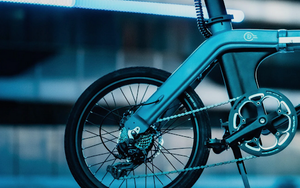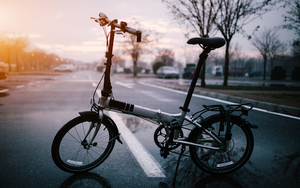Are Electric Scooters Illegal in Ireland?
Sep 16, 2024
Electric scooters have become increasingly popular in recent years as a convenient and eco-friendly mode of transportation. However, there has been much confusion surrounding their legality in Ireland and new regulations have only just come into place. In this article, we will delve into the current legislation and the ongoing debate, as well as compare Ireland's laws with other countries. Additionally, we will explore the future of electric scooters in Ireland and potential changes to legislation.
Understanding the Current Legislation
The Road Traffic Act and Electric Scooters
The current legislation regarding electric scooters in Ireland falls under the Road Traffic Act. According to this act, electric scooters are classified as "mechanically propelled vehicles." Under the Act, it was illegal to use electric scooters on public roads without proper registration, insurance, and a valid driving licence until May 2024. As such, the majority of electric scooters on the market did not meet the legal requirements.
Furthermore, the Road Traffic Act specifies that electric scooter riders must wear appropriate safety gear, including helmets and reflective clothing, to ensure their visibility on the road. Failure to comply with these safety regulations can result in fines and penalties, highlighting the importance of adhering to the legal framework surrounding electric scooter usage.
The Role of the National Transport Authority
The National Transport Authority (NTA) is responsible for overseeing public transport and road safety in Ireland. They have expressed concerns about the safety of electric scooters, particularly in regard to their interaction with other road users and pedestrians. As a result, the NTA has not recommended the legalisation of electric scooters on Irish roads in the past.
In addition to safety concerns, the NTA is also considering the environmental impact of widespread electric scooter usage. While electric scooters offer a more eco-friendly alternative to traditional vehicles, questions have been raised about the disposal of old or damaged scooters and their batteries. The NTA is exploring ways to address these sustainability challenges to ensure that any future legislation regarding electric scooters aligns with Ireland's environmental goals.
Road Traffic Regulations 2024
New regulations surrounding electric scooter use in Ireland have come into play from 20th May 2024. E-scooter users must:
- Be 16 years or older.
- Obey a speed limit of 20km/h.
- Drive on the left. E-scooters are allowed in cycle or bus lanes and on local, regional or national roads.
- Have lights, a bell or audible warning device, reflectors and brakes on their e-scooter and it must be kept in a roadworthy condition at all times.
- Obey signals given by a Garda or school warden and follow the same rules of the road that apply to cyclists, including traffic lights, road signs, and all types of pedestrian crossings.
E-scooter users must NOT:
- Use footpaths, pedestrianised areas or motorways.
- Hold or use a mobile phone.
- Have a seat on their e-scooter.
- Carry passengers or goods.

The Debate Around Electric Scooter Legality
Safety Concerns and Electric Scooters
One of the main arguments that was against legalising electric scooters in Ireland is the potential safety risks they pose. Electric scooters can travel at high speeds and lack adequate safety features such as lights and indicators. This raises concerns about accidents and collisions, especially in busy urban areas. Proponents of electric scooters argue that with proper regulations and safety measures in place, these risks can be minimised.
Furthermore, the issue of pedestrian safety was and still is a significant point of contention in the debate. Critics argue that electric scooters, when ridden on pavements or pedestrian paths, can pose a threat to walkers and joggers. The silent nature of electric scooters can startle pedestrians, leading to potential accidents and conflicts. Advocates for electric scooters suggest designated lanes or areas for scooter use to mitigate these safety concerns and ensure harmonious coexistence with pedestrians.
Environmental Impact and Public Opinion
Another aspect of the debate revolves around the environmental impact of electric scooters. Supporters argue that electric scooters offer a greener alternative to traditional vehicles, reducing carbon emissions and congestion. However, opponents highlight concerns about the potential increase in electric scooter usage leading to more traffic congestion and potential damage to pedestrian areas.
In addition, the issue of battery disposal and recycling has emerged as a key environmental consideration in the discussion. Electric scooters rely on lithium-ion batteries, which can be challenging to recycle and may contribute to electronic waste if not managed properly. Proponents emphasise the importance of implementing effective battery recycling programs to offset the environmental impact of widespread electric scooter adoption. Addressing these concerns is crucial in shaping public opinion and regulatory decisions regarding the integration of electric scooters into urban transportation systems.

Comparing Ireland's Laws with Other Countries
Electric Scooter Laws in the UK
Across the Irish Sea, the United Kingdom has implemented a different approach to electric scooter legislation. In select areas, electric scooters have been legalised as part of government-led trials. These trials aim to assess their safety and impact on traffic flow. However, it is important to note that even in these trial areas, there are specific regulations in place, including speed limits and age restrictions. Even though Ireland has legalised electric scooters, the UK has not yet taken that step.
Electric Scooter Laws in the EU
Looking further afield, several countries in the European Union have also introduced legislation to allow electric scooters on their roads. The specifics of these laws vary from country to country but generally include restrictions on speed, age limits, and the requirement of a driving licence and/or insurance. These countries have sought to strike a balance between promoting environmentally friendly transportation while ensuring safety and order on their roads.

The Future of Electric Scooters in Ireland
Impact on Electric Scooter Sales and Usage
Now electric scooters are legal in Ireland, it will undoubtedly have a significant impact on sales and usage. More individuals are likely to invest in electric scooters for commuting and shorter journeys, leading to a reduction in emissions and congestion. The Riley RS2 V2 makes for a great commuter scooter. However, the implementation of proper regulations and guidelines will be crucial in ensuring the safe integration of electric scooters into the existing transportation network.

Conclusion
In conclusion, electric scooters are currently legal in Ireland under the Road Traffic Act. The National Transport Authority has expressed concerns about their safety but measures are being put in place. However, the debate around electric scooter legality continues, with arguments centred around safety, environmental impact, and public opinion. Comparisons with other countries, such as the UK and various EU nations, highlight alternate approaches to electric scooter legislation. As the popularity of electric scooters grows, it is vital to strike a balance between promoting greener modes of transportation and ensuring the safety and order on our roads.
At e-Dash we have a great range of e-scooters available and can ship to Ireland.






